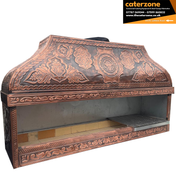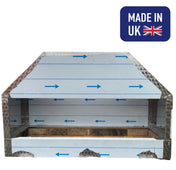Maximize ROI on Catering Equipment Purchases
Running a thriving catering business depends on making smart financial choices including the selection of suitable kitchen equipment. Careful selection together with smart planning plays a key role in optimizing your investment returns. Your catering business's profitability hinges on this particular factor.
Caterzone recognizes the complex equipment purchasing decisions faced by chefs and catering professionals. Owners of businesses need to strike a balance between the quality and performance of equipment and their financial limitations. Choosing commercial kitchen equipment demands thorough evaluation.
The process of smart equipment purchase extends beyond the basic act of buying new items. Using a strategic approach to buy equipment results in long-term business expansion. When equipment purchasing decisions are based on comprehensive market research and homework, they yield significant benefits.
Optimal equipment selection through effective decision-making enables better functionality while minimizing waste. Choosing better equipment helps your business achieve higher profit margins.
This guide compiles essential details to support you in making smart choices about your equipment. This guidance will enable your catering company to maximize its investment returns. Your business can achieve sustainable expansion by implementing this strategic approach.
Strategic Investment Planning for Commercial Kitchen Equipment
Choosing suitable commercial kitchen equipment requires multi-faceted decision-making processes. Selecting equipment needs a combination of innovative features with functional performance and budget-friendly expenditures. Catering businesses must plan their investments carefully. Your business objectives should align with the equipment selection process which also needs to match present market demands.
Effective business growth is built on a comprehensive knowledge of business operations. Caterzone offers a detailed guideline for choosing suitable equipment.
Conducting Thorough Market Research
Selecting suitable equipment requires an effective market research process. You should:
- Review the current advancements in kitchen technology.
- Check out reports from the industry
- Attend trade shows to watch how equipment functions during demonstrations.
- Get insights by consulting professionals who work in food service industries.
Establishing Clear Budget Parameters
Before buying kitchen equipment you need to establish a financial plan. Make a detailed budget that includes:
- The cost of buying the equipment
- What it costs to set it up
- What you'll spend on keeping it running
- Any savings on energy
Identifying Essential vs Optional Equipment
Knowing your real equipment needs allows you to create better financial strategies. Focus on what's most important for:
- What you make
- How you work in the kitchen
- Keeping food quality high
- Growing your business
Following the outlined steps helps catering businesses develop strong decision-making skills. This strategy enables their kitchen equipment investments to deliver maximum performance.
Maximizing ROI on Your Catering Equipment Purchases
Selecting the right catering equipment is crucial for accomplishing business success. Restaurants and cafes together with catering service providers can cut operating costs through this method. Maintaining your financial performance relies heavily on this key element.
Customers can make informed decisions because Caterzone presents a comprehensive variety of equipment options. Consider these guidelines for selecting catering appliances.
- Invest in energy-efficient catering appliances to reduce your continuous operational expenditures.
- Determine the expected lifespan of your catering equipment before you make your purchase decision.
- Compare initial investment against possible energy savings
- Think about maintenance and repair costs
Energy-efficient appliances require more money at first purchase yet deliver significant financial savings over their lifespan. Modern refrigerators and ovens can decrease power usage by as much as 30%. The business experiences significant expense reductions when using this method.
The durability of your equipment directly affects your return on investment effectiveness. The durable equipment from Caterzone lowers the need for replacements while enhancing operational efficiency. The use of durable equipment enables both steady business functions and financial benefits.
Choosing equipment requires more than basic price assessments. Choose appliances which maintain reliable performance and decrease their energy usage. Your catering business stands to gain maximum financial opportunities by implementing this strategic approach.
Conclusion
Investing in catering equipment needs careful thought. Effective financial management demands an integration of cost management strategies with superior performance standards. Research your options first and make a budget which will determine your equipment choices.
Catering businesses today must prioritize environmental sustainability. Choosing long-lasting and high-performance equipment allows you to save money and prevent waste. It also makes your kitchen more eco-friendly.
Caterzone offers a comprehensive range of equipment options designed to help make informed purchasing decisions. Owners of businesses should acknowledge that equipment plays a vital role in enhancing operational performance. By following this practice you will lower your operating costs while staying ahead of competitors in the catering field.
Take a methodical approach to picking equipment. Determine if the equipment fits your business needs alongside budget limitations and future growth plans. This guide demonstrates effective ways to make equipment buying decisions that support your business expansion.
FAQ
How can I determine the right budget for commercial kitchen equipment?
To set a budget, look at your business's finances, expected earnings, and what you need. Think about how long the equipment will last, how much energy it uses, and if it will save you money. Start with the basics and add more as your business grows.
Use 10–15% of your yearly earnings for buying equipment. This way, you get good value without spending too much.
What are the most critical pieces of equipment for a new catering business?
Key items include ovens, fridges, prep tables, stoves, and storage. Choose appliances that do many things well and use less energy. Focus on what's most important for making and keeping food ready.
Start with top-notch refrigerators, reliable stoves, and strong prep surfaces. These are essential for your kitchen.
How do I assess the long-term value of catering equipment?
Look at how durable, energy-efficient, and easy to maintain the equipment is. Also, think about how it will improve your work. Don't just look at the price you pay at first.
Check the warranty, the maker's reputation, and how much energy it saves. Aim for quality that lasts and saves you money over time.
What are the benefits of investing in energy-efficient catering equipment?
Energy-saving gear cuts down on bills, is better for the planet, and might get you tax breaks. It uses less power and gas, saving you money over time. This is a smart choice for your wallet and the environment.
How often should commercial kitchen equipment be replaced?
When to replace depends on how much you use it, how well you take care of it, and new tech. Usually, big items need checking every 5–7 years. Keep an eye on how it's doing and replace it when it's really worth it.
Look at repair costs, how often you need to fix things, and if new stuff would make your work better.
What financing options are available for catering equipment purchases?
There are many ways to pay, like leasing, loans, special financing, and vendor plans. Look at hire purchase and leasing for flexibility. Compare rates, terms, and tax perks to find the best fit for you.
How can I ensure I'm making a cost-effective equipment purchase?
Do your homework, compare prices, and ask for detailed quotes. Think about all costs, including setup, upkeep, and energy savings. Ask to see the equipment in action, read reviews, and talk to experts.
Choose quality and usefulness over the cheapest option. Pick what's best for your business in the long run.



